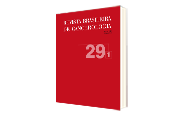Imunoterapia Ativa Específica e imunoquimioterapia Adotiva em Tumores Experimentais. Ação da “interleukin-2”
DOI:
https://doi.org/10.32635/2176-9745.RBC.1982v29n1.3520Palavras-chave:
Imunoterapia Ativa, Interleucina-2Resumo
Uma preparação de proteínas de membrana plasmática de células tumorais obtida por processo original de vesiculação de membrana celular é usada como antígeno especifico do tumor. Em sistema singênico protegeu 80% dos camundongos contra inóculo tumoral. Inóculo tumoral já estabelecido, em início de crescimento, é curado em 70 a 80% com inoculação de antigeno de membrana com adjuvante, em tumores experimentais de camundongo: A imunoterapia adotiva específica, isto é, a transferência de linfócitos pré-sensibilizados, não protegeu camundongos contra tumor já desenvolvido. A imunoquimioterapia adotiva, transferência de linfócitos de baço de animal Imunizados pelo tumor + 1 dose de ciclofosfamida foi eficiente, curando 80% dos animais com tumor singênico já estabelecido, sendo que a cidofosfamida apenas retarda temporariamente o crescimento tumoral. Este projeto não tem aplicação clínica, pois para o doente não se dispõe de linfócitos isogênicos sensibilizados especificamente contra seu câncer. Está sendo tentada a substituição de linfócitos T sensibilizados por "lnterleukin-2" + cidofosfamida. A "lnterleukin-2" é obtida in vitro por ação de macrófago + Hnfódto T helper + concanavalina A. Experiências preliminares em tumores experimentais deram nítido retardamento do crescimento dos mesmos. Este produto está sendo purificado e concentrado e produzido especificamente com antígeno do próprio tumor.
Downloads
Referências
ABREU, L.A. & ABREU, R.R, - Effect of cyclophosphamide on sérum ceruloplasmin oxidase activity In sarcoma bearing rats. Arch. Geschwulstforsch 51: 394-397 (1981).
BERENDT. M.J, & NORTH, R.J.- T-cell-mediated suppression of antitumor ímmunítv. An explanatíon of Progressive growth of a immunogenic tumor. J. Exp. Med. 151: 69-80 (1980). DOI: https://doi.org/10.1084/jem.151.1.69
CALABRESI, P & PARKSJR , E.R.- Alkylating agents, antimetabolites, hormones, and others antiprollferating agents tn: The pharmacological basis of therapeutics. L.S. Goodman & A, Gilman. eds., 5th ed., Mac Miilan, New York. pp 1254-1307 (1975).
CASTRO FARIA, H., GRYNBERG, N.F, SOUZA. AS. R. & GOMES, R M. - Eradication of established munne tumor with plasma membrane vesicles and Corynebacteríum granutosum fractíon. 4th Int, Congress of Immunology. Raris, abstr 10.5 11 (1980).
CHEEVER, M.A., GREENBERG, P.P. & FEFER, A. — Specificity of adoptive chemoimmunotherapy of established syngeneic tumors. J. Immunol. 125: 711 (1980). DOI: https://doi.org/10.4049/jimmunol.125.2.711
FARIA, H C., PREZA, P., MARINHO, R, & BASTOS, V.C. — Specific resistence elicited in mice or rats by injection of plasmatic membrana from syngeneic tumor cells obtained by a nevy technique. XII Congresso Int. del Cancer, abstr, 1/22 Buenos Aires (1978).
FEFER, A. — Tumor Immunotherapy. In.-Antineoplastic and Immunosuppressive agents I. A.C. Sartorelli and D.G. Johns, eds., Springer-Verlag. Berlin, Heidelberg, New York, pp, 528-554 (1974). DOI: https://doi.org/10.1007/978-3-642-65678-1_26
GOMES, R M., PREZA, P., BASTOS, V.C., COELHO, M.G.P., KOVARY, K. & CASTRO FARIA, H. – Controle do crescimento do tumor experimental, 1. Proteção do hospedeiro por inoculação prévia da fração de membrana plasmática de célula tumoral. Rev. Bras. de Pesquisas Méd. e Biol. 711: 229-236 (1978).
GRONVIK, KrO. &ANDERSON.J.- The role of T cell growth stimulating factors in T cell triggering. Immunol. Rev. 51: 35-57 (1980). DOI: https://doi.org/10.1111/j.1600-065X.1980.tb00316.x
HARDT, C., HEEG, K., PFIZENMAIER, K. ROLLENGHOFF, M. & WAGNER. H. - Regulation of cytotoxic T lymphocyte (CTL) responses in vivo: Functional activity of Ly 1 T helper cell derived lnterleukin-2 (IL-2) is controlled byT cell derived IL-2 inhibitor, 4th Int. Congress of Immunology, abstr. 6.4.05, Paris (1980).
WAGNER. H., HARDT, C., HEEG, K. PFIZENMAIER, K., SOLBACH, W., BARTLETT R., STOCKINGER, H & ROLLINGHOF, M, T-T cell interactions, during cytotoxic T lymphocyte .(CTL) responses; T cell derived helper fator (lnterleukin-2) as a probe to analyse CTL responsiveness and thynic maturation of CTL progenitors. Immunol. Rev. 51: 215-255 (1980). DOI: https://doi.org/10.1111/j.1600-065X.1980.tb00323.x
WATSON, J. & MOCHIZUKI, D, - interleukin-2; A class of T cell growth factors. — Immunol, Rev. 51 ;257-278 (1980). DOI: https://doi.org/10.1111/j.1600-065X.1980.tb00324.x
Downloads
Publicado
Como Citar
Edição
Seção
Licença

Este trabalho está licenciado sob uma licença Creative Commons Attribution 4.0 International License.









